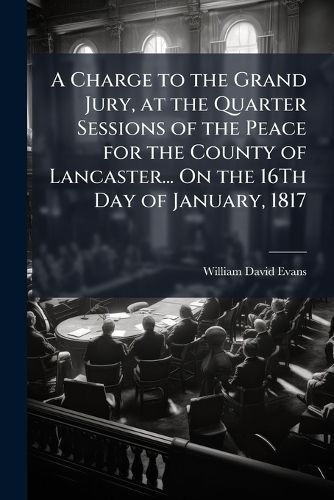Readings Newsletter
Become a Readings Member to make your shopping experience even easier.
Sign in or sign up for free!
You’re not far away from qualifying for FREE standard shipping within Australia
You’ve qualified for FREE standard shipping within Australia
The cart is loading…






This is a digitally restored and enhanced version of "A Charge to the Grand Jury, at the Quarter Sessions of the Peace for the County of Lancaster... On the 16Th Day of January, 1817," delivered by William David Evans. The text offers insights into the legal and social issues of early 19th-century England. Evans's charge provides a detailed overview of the duties and responsibilities of the grand jury within the context of the quarter sessions court.
The document is valuable for legal scholars, historians, and anyone interested in the development of English common law and the administration of justice during this period. It sheds light on the concerns and challenges faced by the legal system at a time of significant social and political change.
This work has been selected by scholars as being culturally important, and is part of the knowledge base of civilization as we know it. This work was reproduced from the original artifact, and remains as true to the original work as possible. Therefore, you will see the original copyright references, library stamps (as most of these works have been housed in our most important libraries around the world), and other notations in the work.
This work is in the public domain in the United States of America, and possibly other nations. Within the United States, you may freely copy and distribute this work, as no entity (individual or corporate) has a copyright on the body of the work.
As a reproduction of a historical artifact, this work may contain missing or blurred pages, poor pictures, errant marks, etc. Scholars believe, and we concur, that this work is important enough to be preserved, reproduced, and made generally available to the public. We appreciate your support of the preservation process, and thank you for being an important part of keeping this knowledge alive and relevant.
$9.00 standard shipping within Australia
FREE standard shipping within Australia for orders over $100.00
Express & International shipping calculated at checkout
Stock availability can be subject to change without notice. We recommend calling the shop or contacting our online team to check availability of low stock items. Please see our Shopping Online page for more details.
This is a digitally restored and enhanced version of "A Charge to the Grand Jury, at the Quarter Sessions of the Peace for the County of Lancaster... On the 16Th Day of January, 1817," delivered by William David Evans. The text offers insights into the legal and social issues of early 19th-century England. Evans's charge provides a detailed overview of the duties and responsibilities of the grand jury within the context of the quarter sessions court.
The document is valuable for legal scholars, historians, and anyone interested in the development of English common law and the administration of justice during this period. It sheds light on the concerns and challenges faced by the legal system at a time of significant social and political change.
This work has been selected by scholars as being culturally important, and is part of the knowledge base of civilization as we know it. This work was reproduced from the original artifact, and remains as true to the original work as possible. Therefore, you will see the original copyright references, library stamps (as most of these works have been housed in our most important libraries around the world), and other notations in the work.
This work is in the public domain in the United States of America, and possibly other nations. Within the United States, you may freely copy and distribute this work, as no entity (individual or corporate) has a copyright on the body of the work.
As a reproduction of a historical artifact, this work may contain missing or blurred pages, poor pictures, errant marks, etc. Scholars believe, and we concur, that this work is important enough to be preserved, reproduced, and made generally available to the public. We appreciate your support of the preservation process, and thank you for being an important part of keeping this knowledge alive and relevant.